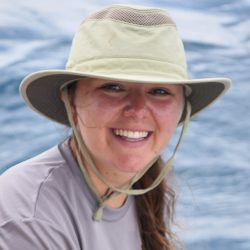The Benjamin School participated in a Coastal Ocean Explorers: Sharks expedition aboard R/V ANGARI with ANGARI crew and scientists from Florida International University.
EXPEDITION DETAILS
March 8, 2024
Palm Beach County, FL
Sara Casareto
Sophia Hemsi
Erin Johnson
William Sample
Sara Schoen
All sharks were fished for, caught, studied and released for research purposes under Florida permits held by Florida International University scientists.
As part of our Coastal Ocean Explorers: Sharks education program, middle school students and educators from The Benjamin School boarded R/V ANGARI to learn from and work directly with scientists from Florida International University College of Arts, Sciences & Education to conduct shark research in local waters. The students had a successful science-filled day onboard where they learned firsthand about the scientific field methods used to study marine life. They kicked off the expedition working with the scientists to assemble, bait and deploy a baited remote underwater video system (BRUVS) to observe marine life within the Lake Worth Lagoon. BRUVS are non-invasive and consist of a camera and bait box mounted to a metal frame that is placed on the seafloor and left filming for 60 minutes. While the BRUVS survey was underway, the participants developed their species identification and data collection skills using curated footage from previous BRVUS deployments. During this time, we also observed numerous sea hares swimming in the vicinity of the vessel, and upon reviewing our BRUVS footage, we were excited to find that one was even captured on our own BRUVS video!
With the BRUVS survey complete, R/V ANGARI headed offshore so the scientists and participants could begin drumline fishing. Drumlines are specialized research fishing equipment that includes circle hooks and a configuration that enables hooked sharks to continue to swim freely in order to minimize stress on the animal. Upon recovery of their baited drumlines, The Benjamin School students and teachers were excited to discover that we had three successful drumline deployments, each with a different species of shark caught on the line! This included a male lemon shark, a male nurse shark and a female tiger shark. The students worked side-by-side with the scientists to conduct quick workups on the sharks prior to release. These workups consisted of the collection of a series of measurements, taking of a small fin clip sample and the application of a uniquely numbered identification tag from the National Oceanic and Atmospheric Administration’s Cooperative Shark Tagging Program. The scientists, crew and participants were all excited by the diversity of sharks they were able to study and observe over the course of the day, and particularly the lemon shark as this is not a species we catch frequently during our expeditions. As R/V ANGARI returned to the dock, everyone gathered on the flybridge to debrief about the day’s successful shark research and conservation efforts.
CHIEF SCIENTIST

Sara Casareto is a Ph.D. candidate in the Marine Community and Behavioral Ecology Lab at Florida International University. Her work focuses on behavioral ecology and trophic interactions. Her current research centers around elasmobranch biology and ecology, looking at different factors that affect juvenile shark behavior and decision making in coastal waters. The specific questions she is interested in involve risk from larger sharks, abiotic factors like salinity and temperature, and the presence/absence of different shark species. Originally from Maryland, Sara has been in Florida since 2016. She holds a B.S. in Biology-Marine Science from the University of Tampa and has studied marine species ranging from sharks to photosynthetic sea slugs. Sara hopes to further her career in predator-prey interactions to help elucidate management and conservation strategies for shark and ray populations. A passionate educator, Sara is involved in outreach through National Geographic and The Rookery Bay National Estuarine Research Reserve and ANGARI Foundation.


